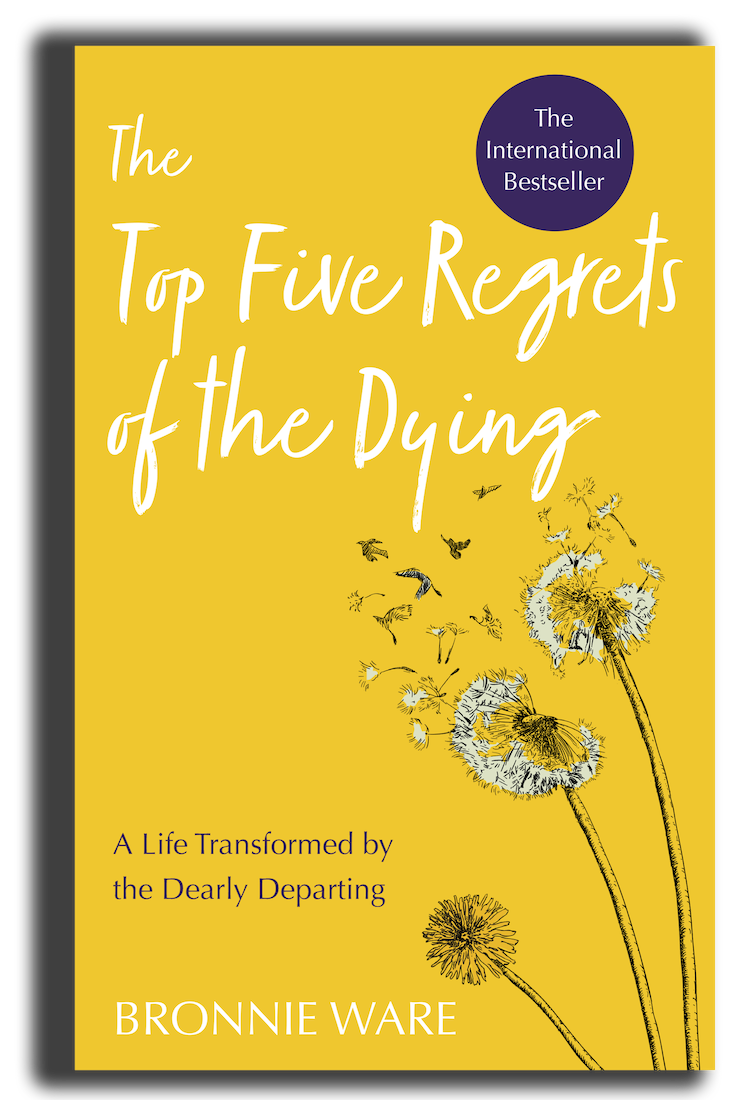I read The Top 5 Regrets of the Dying by Bronnie Ware back in 2016 and it changed my life!
The book is written by an experienced end-of-life care nurse who dedicated years to working with patients in their final days. As a hospice nurse, Ware sat with people from all walks of life and backgrounds in their last few weeks of life, almost always just meeting them for the first time in their final days.
She listened to their stories, engaged in thoughtful conversations, and held space for each person as they began their transitions. After many years, she realized that all of the “regrets” people had fell into 5 main categories.
It’s thought-provoking, reflective, and a book that I think every person will benefit from.
With profound insight and understanding, Ware gained a unique perspective through her extended time spent with people from diverse backgrounds and walks of life, allowing her to listen closely to their deepest regrets as their lives drew to a close.
The New York Times bestseller highlights the most common regrets expressed by patients during their final days, providing readers with valuable insights into how to live a more fulfilling life. The book is particularly helpful for individuals who may be feeling stuck or unfulfilled in their current situation or for those who are seeking to make changes in their lives.
Published in 2012, The Top 5 Regrets of the Dying has since gained widespread popularity and acclaim. It has been translated into several languages and has inspired people around the world to live more fulfilling lives. In my opinion, this book is life-changing, and every person on the planet can benefit from the lessons it shares.
The Top 5 Regrets of the Dying Are:
- “I wish I’d had the courage to live a life true to myself, not the life others expected of me.”
- “I wish I hadn’t worked so hard.”
- “I wish I’d had the courage to express my feelings.”
- “I wish I had stayed in touch with my friends.”
- “I wish that I had let myself be happier.”
The book is based on Ware’s personal experiences with patients who were under her care as they were in the last weeks and days of their lives in hospice. She noticed that many of them expressed similar regrets about how they had lived their lives. After listening to their stories, she compiled a list of the top five regrets of the dying.
It’s important to read the book as it’s filled with stories that will help you understand each of the regrets. Here’s a short summary of each:
Regret 1: “I wish I’d had the courage to live a life true to myself, not the life others expected of me.”
The first regret on the list is perhaps the most powerful.
Many people live their lives according to the expectations of others rather than following their own dreams and desires.
Ware’s patients often expressed regret for not living a life true to themselves. They wished they had pursued their passions, taken risks, and lived more authentically.
Regret 2: “I wish I hadn’t worked so hard.”
Oof. This one hits hard for a lot of people. Many of us were taught that the only way to get ahead in life is to work extra hard.
This second regret on the list highlights the danger of becoming too focused on work at the expense of other aspects of life. Many of Ware’s patients regretted spending too much time working and not enough time with family and friends. They wished they had prioritized relationships over their careers.
One story from the second regret in the book, “I wish I hadn’t worked so hard,” is about a man named Jack. Jack had spent most of his life working long hours as a corporate executive, which had left him little time for his family and personal pursuits.
As Jack’s health declined, he was admitted to a hospice where Bronnie Ware was working. In their conversations, Jack expressed deep regret about the time he had lost with his family and how he had missed out on important moments in their lives.
Jack’s son visited him in the hospice and shared a memory of a time when they had gone camping together. He told his father how much that experience had meant to him and how he had always cherished it. Jack was moved to tears and realized that, despite his long hours at work, he had still been able to create meaningful memories with his family.
In his final days, Jack spent time reflecting on his life and writing letters to his loved ones, expressing his regret for not spending more time with them. Though he could not turn back time, he found peace in the knowledge that he had created some cherished memories with his family and expressed his love and appreciation for them in his final days.
Regret 3: “I wish I’d had the courage to express my feelings.”
The third regret is related to the second, as many people suppress their emotions to maintain their professional image. Ware’s patients often wished they had been more honest about their feelings, and expressed regret for not having the courage to speak up when it mattered.
One short story from the third regret in the book, “I wish I’d had the courage to express my feelings,” is about a woman named Margaret. Margaret had always been a people pleaser and had struggled to express her true feelings for fear of upsetting others or being judged.
As Margaret’s health declined, she was admitted to a hospice where Bronnie Ware was working. In their conversations, Margaret shared her regret about not speaking up for herself and expressing her true feelings throughout her life.
One day, Margaret’s daughter visited her in the hospice and told her mother that she had always wished that Margaret had been more open and honest about her feelings. Margaret was moved to tears and realized that her fear of speaking up had caused her to miss important opportunities to connect with her loved ones.
In her final days, Margaret found the courage to express her true feelings and thoughts to her family and was able to have some meaningful conversations with them. Though it was difficult, she found peace in knowing that she had finally spoken her truth and expressed her love and appreciation for her family in her final days.
Regret 4: “I wish I had stayed in touch with my friends.”
The fourth regret on the list highlights the importance of maintaining connections with friends and loved ones.
Many of Ware’s patients expressed regret for losing touch with friends over the years and wished they had made more of an effort to stay in touch.
Regret 5: “I wish that I had let myself be happier.”
Finally, the fifth regret is perhaps the most surprising, as many people assume that happiness is something that just happens to them. Ware’s patients often expressed regret for not allowing themselves to be happier, and wished they had pursued joy and positivity in their lives.
One of the short stories from the fifth regret in the book, “I wish that I had let myself be happier,” is about a woman named Maria. Maria had always been a worrier and had struggled to let go of her anxieties and enjoy the present moment.
As Maria’s health declined, she was admitted to a hospice where Bronnie Ware was working. In their conversations, Maria expressed deep regret about not allowing herself to be happier throughout her life.
One day, Maria’s family brought in a photo album and began reminiscing about happy times they had shared together. As Maria looked through the photos, she realized that she had been so focused on her worries and fears that she had missed out on many happy moments in her life.
In her final days, Maria made a conscious effort to focus on the present moment and to find joy in simple pleasures. She spent time with her loved ones, listened to music, and enjoyed the beauty of nature. Though she could not turn back time, Maria found peace knowing that she had finally allowed herself to be happier and appreciate life’s beauty in her final days.
This book can be beneficial for those seeking to live a life more true to themselves or those seeking to make changes in their lives.
The Top 5 Regrets of the Dying is a powerful book that provides readers with valuable insights into how to live a more fulfilling life. Ware’s patients’ experiences remind us that life is short, and that we should make the most of every moment. By prioritizing relationships, pursuing our passions, expressing our emotions, and allowing ourselves to be happy, we can avoid the most common regrets of the dying and live a life without regret.
Grab your copy of The book on Amazon here (affiliate link) or wherever books are sold.
And check out my other book recommendations here >







Leave A Review + Read The Comments →